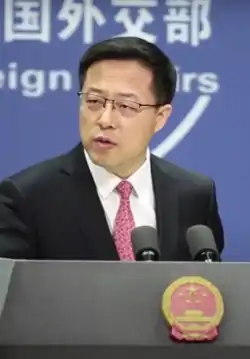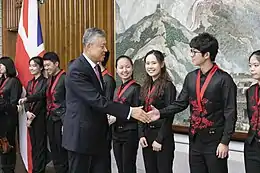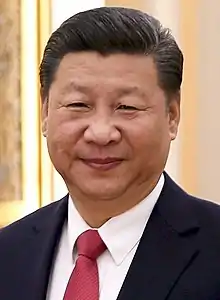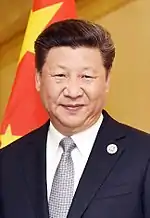Wolf warrior diplomacy
Wolf warrior diplomacy (Chinese: 战狼外交; pinyin: zhànláng wàijiāo) describes an aggressive style of diplomacy purported to be adopted by Chinese diplomats in the 21st century, under Chinese leader Xi Jinping's administration. The term was coined from a Rambo-style Chinese action film, Wolf Warrior 2. In contrast to prior Chinese diplomatic practice, which had emphasized the avoidance of controversy and the use of cooperative rhetoric, wolf warrior diplomacy is more combative, with its proponents loudly denouncing criticisms of China on social media and in interviews.[1]

Although the phrase "wolf warrior diplomacy" was only popularized as a description for this diplomatic philosophy during the COVID-19 pandemic, the appearance of wolf warrior-style diplomats began a few years prior. Chinese leader and Chinese Communist Party general secretary Xi Jinping's foreign policy writ large, perceived anti-China hostility from the West amongst Chinese government officials, and shifts within the Chinese diplomatic bureaucracy have been cited as factors leading to its emergence.
Overview
| ||
|---|---|---|
|
Policies and theories
Key events
Diplomatic activities
|
||
 | ||

Wolf warrior diplomacy is characterized by Chinese diplomats' use of confrontational rhetoric,[2][3] as well as diplomats' increased willingness to rebuff criticism of China and court controversy in interviews and on social media.[1] It is a departure from former Chinese foreign policy, which focused on working behind the scenes, avoiding controversy and favoring a rhetoric of international cooperation,[4] exemplified by the maxim that China "must hide its strength" in international diplomacy.[5] This change reflects a larger change in how the Chinese government and the CCP relate and interact with the larger world.[6] Allegedly, efforts aimed at incorporating the Chinese diaspora into China's foreign policy have also intensified with an emphasis placed on ethnic loyalty over national loyalty.[7]
Wolf warrior diplomacy began to emerge in 2017, although components of it had already been incorporated into Chinese diplomacy before then. An assertive diplomatic push resembling wolf warrior diplomacy was also noted following the 2008 financial crisis. The emergence of wolf warrior diplomacy has been tied to Xi Jinping's political ambitions, as well as perceived anti-China hostility from the West amongst Chinese government officials.[5]
"Wolf warrior" began to see use as a buzzword during the COVID-19 pandemic.[8] In Europe, leaders have expressed surprise at the Chinese using a diplomatic tone with them that they previously would only have used with small or weak countries, with the messaging shifting from a tone of collaboration to one of opposition.[5]
One factor which may have helped bring about wolf warrior diplomacy was the addition of a public relations section to internal employee performance reports. This incentivized Chinese diplomats to be active on social media and give controversial interviews. Additionally, a younger cadre of diplomats that worked its way up the ranks of the Chinese diplomatic service and this generational shift is also seen as accounting for part of the change.[9] Activity on social media was greatly increased and the tone of social media engagement became more direct and confrontational.[10] China says wolf warrior diplomacy is a "necessary" response to Western diplomats' social media presences.[1] More specifically, foreign vice-minister Le Yucheng says he believes that foreign countries "are coming to our doorstep, interfering in our family affairs, constantly nagging at us, insulting and discrediting us, [so] we have no choice but to firmly defend our national interests and dignity".[11]
Etymology
.jpg.webp)
The phrase is derived from the patriotic Rambo-style Chinese film Wolf Warrior 2.[10] Wolf Warrior 2’s tagline was "Even though far away, anyone who affronts China will pay." (Chinese: 犯我中华者,虽远必诛)[1] At the end of the film the cover of the Chinese passport is displayed along with text reading "Citizens of the PRC: When you encounter danger in a foreign land, do not give up! Please remember, at your back stands a strong motherland."[4]
Wolf warrior diplomacy proponents and practitioners
Aside from Xi Jinping, Zhao Lijian, Hua Chunying and Liu Xiaoming have been described as prominent proponents of wolf warrior diplomacy.[1]
In late 2020 Zhao Lijian used his account to circulate a digitally-manipulated image of a child having its throat cut by an Australian soldier.[12] Global commentators called the tweet "a sharp escalation" in the dispute between China and Australia.[13] Within hours the image was found to have been created by Wuheqilin, a self-styled Chinese "wolf warrior" artist.[13] Reuters reported Prime Minister Scott Morrison describing Zhao's tweet as "truly repugnant" and that, "the Chinese government should be utterly ashamed of this post. It diminishes them in the world's eyes."[14] The next day the Chinese foreign ministry rejected Australian demands for an apology.[15] The incident was damaging to Australia–China relations.[16] The effect of Zhao's tweet has been to unify Australian politicians across party lines in condemning the incident and China more generally.[17] On the other hand, Zhao's tweet also garnered a strong wave of support in China, with Wuheqilin's Weibo account doubling in followers to 1.24 million.[18]
Response
Wolf warrior diplomacy has often garnered a strong response and in some cases has provoked a backlash against China and specific diplomats.[19] By 2020, The Wall Street Journal was reporting that the rise of Wolf Warrior diplomacy had left many politicians and businesspeople feeling targeted.[20] A survey by Pew Research found that 78% of people in Western nations have "not too much or no confidence" in China's leadership to do the right thing regarding world affairs.[21] In December 2020, Nicolas Chapuis, an ambassador of the European Union to China, warned that:
“What happened during the last year…is a massive disruption or reduction in support in Europe, and elsewhere in the world, about China. And I’m telling that to all my Chinese friends, you need to seriously look at it.”[20]
Cat warrior diplomacy
The Taiwanese representative to the United States of America Hsiao Bi-khim has been described as a "cat warrior"[22] and has started using the term herself.[23][24] Other Taiwanese diplomats have also been characterized as cat warriors for their flexibility and agility. Cat warrior diplomacy is seen as focusing on the soft power aspects of Taiwan's advanced economy, democracy, and respect for human rights as well as using Chinese aggression to highlight the differences between their two political systems.[25]
See also
References
- Jiang, Steven; Westcott, Ben. "China is embracing a new brand of foreign policy. Here's what wolf warrior diplomacy means". www.cnn.com. CNN. Archived from the original on 29 May 2020. Retrieved 30 May 2020.
- NAKAZAWA, KATSUJI. "China's 'wolf warrior' diplomats roar at Hong Kong and the world". nikkei.com. Nikkei Asia Review. Archived from the original on 28 May 2020. Retrieved 27 May 2020.
- Wu, Wendy. "Chinese Foreign Minister Wang Yi defends 'wolf warrior' diplomats for standing up to 'smears'". www.scmp.com. SCMP. Archived from the original on 27 May 2020. Retrieved 27 May 2020.
- Syed, Abdul Rasool. "Wolf warriors: A brand new force of Chinese diplomats". moderndiplomacy.eu. Modern Diplomacy. Archived from the original on 17 July 2020. Retrieved 31 July 2020.
- Hille, Kathrin. "'Wolf warrior' diplomats reveal China's ambitions". www.ft.com. Financial Times. Archived from the original on 3 July 2020. Retrieved 31 July 2020.
- Zhu, Zhiqun. "Interpreting China's 'Wolf-Warrior Diplomacy'". thediplomat.com. The Diplomat. Archived from the original on 19 June 2020. Retrieved 31 July 2020.
- Wong, Brian. "How Chinese Nationalism Is Changing". thediplomat.com. The Diplomat. Archived from the original on 23 August 2020. Retrieved 30 May 2020.
- Wang, Earl. "How Will the EU Answer China's Turn Toward 'Xi Jinping Thought on Diplomacy'?". thediplomat.com. The Diplomat. Archived from the original on 31 July 2020. Retrieved 30 July 2020.
- Loh, Dylan M.H. "Over here, overbearing: The origins of China's 'Wolf Warrior' style diplomacy". hongkongfp.com. Hong Kong Free Press. Archived from the original on 10 July 2020. Retrieved 31 July 2020.
- Allen-Ebrahimian, Bethany. "China's "Wolf Warrior diplomacy" comes to Twitter". www.axios.com. Axios. Archived from the original on 1 July 2020. Retrieved 31 July 2020.
- Zhou, Cissy. "We're not Wolf Warriors, we're only standing up for China, says senior official". SCMP. SCMP. Retrieved 13 December 2020.
- Rej, Abhijnan. "Australia Livid as Chinese Foreign Ministry Spokesperson Tweets Offensive Image". thediplomat.com. The Diplomat. Retrieved 30 November 2020.
- "Chinese official tweets doctored image of alleged Australian war crime in Afghanistan, Morrison demands apology". Hindustan Times. 2020-11-30. Retrieved 2020-11-30.
- Needham, Kirsty (2020-11-30). "Australia demands apology from China after fake image posted on social media". Reuters. Retrieved 2020-11-30.
- Hurst, Daniel; Davidson, Helen. "China rejects Australian PM's call to apologise for 'repugnant' tweet with fake image of soldier". www.theguardian.com. The Guardian. Retrieved 30 November 2020.
- Hollingsworth, Julia. "Australia demands apology after Chinese official tweets 'falsified image' of soldier threatening child". www.cnn.com. CNN. Retrieved 30 November 2020.
- Hurst, Daniel; Davidson, Helen; Visontay, Elias. "Australian MPs unite to condemn 'grossly insulting' Chinese government tweet". www.theguardian.com. The Guardian. Retrieved 30 November 2020.
- Siow, Maria. "Australian PM's bid to stir nationalism over Twitter image succeeds – but in China". SCMP. SCMP. Retrieved 13 December 2020.
- Dupont, Alan. "Who's afraid of the big bad wolves?". www.theaustralian.com.au. The Australian. Archived from the original on 23 August 2020. Retrieved 22 August 2020.
- Norman, Drew Hinshaw, Sha Hua and Laurence (2020-12-28). "Pushback on Xi's Vision for China Spreads Beyond U.S." Wall Street Journal. ISSN 0099-9660. Retrieved 2020-12-29.
- "Unfavorable Views of China Reach Historic Highs in Many Countries". Pew Research Center's Global Attitudes Project. 2020-10-06. Retrieved 2020-12-29.
- Ho, Matt. "New Taiwan envoy to America sees potential risks and rewards in China-US rivalry over economy and tech". www.scmp.com. South China Morning Post. Retrieved 3 December 2020.
- Everington, Keoni. "Taiwan 'cat warrior' envoy to US ready to fight China's 'wolf warriors'". www.taiwannews.com.tw. Taiwan News. Archived from the original on 21 July 2020. Retrieved 22 August 2020.
- Liu, Natalie. "Taiwan's New Envoy to Washington Has Deep Ties to America". international.thenewslens.com. The News Lens. Archived from the original on 23 August 2020. Retrieved 22 August 2020.
- Glauert, Rik. "Taiwan's 'cat warriors' counter attacks from China's 'wolves'". asia.nikkei.com. Nikkei. Retrieved 3 December 2020.



.svg.png.webp)